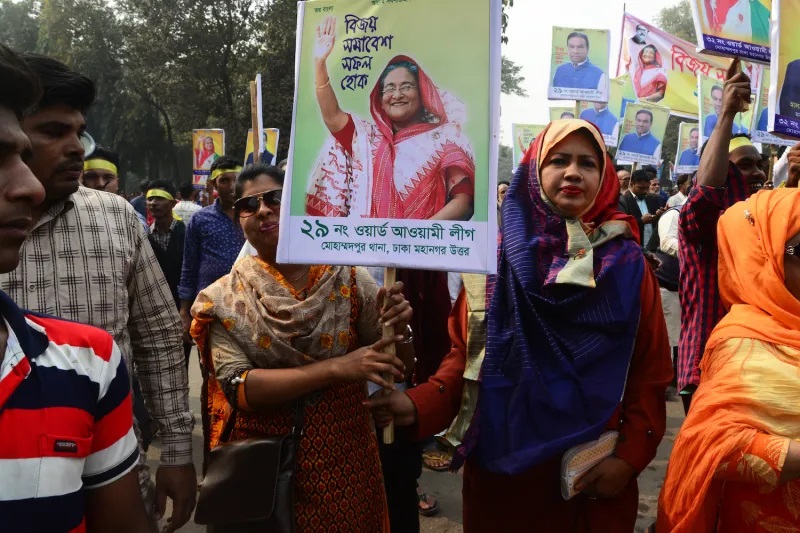An outspoken Deshi journalist Muktadir Rashid Romeo tweets (now X) “In politics, there is no permanent enemy or friend. Yet power matters but power is a perishable item.”
The Muslim religious, rightists and King’s parties have queued outside Prime Minister Sheikh Hasina’s official residence Gono Bhaban to seek her blessings. The minority left parties seem to have boycotted the election.
Kalyan Party, a King’s party and the Muslim League shun one-point anti-government movement unless Hasina steps down and has received “political blessings” from Hasina.
Earlier, the leaders of nine Islamic parties met with the prime minister regarding the forthcoming election and held a parley for over two and a half hours.
The parties whose leaders called upon the prime minister’s official residence are Islami Oikya Jote, Islamic Front Bangladesh, Bangladesh Islami Front, Bangladesh Khelafat Andolan, Bangladesh Muslim League, Bangladesh Supreme Party, Bangladesh Islami Oikya Jote, Ashekane Auwlia Oikya Parishad, and Jamiyate Ulema-e Islam Bangladesh.
Among the Islamist parties, four with ‘political clout’ Qawmi-madrasa-based parties—Islami Andolon Bangladesh, Bangladesh Khelafat Majlish, Jamiat Ulema-e-Islam and Khelafat Majlish have stepped down from participating in the election.
The Islami Oikya Jote and Jamiyate Ulema-e Islam and a few others had been in the BNP-led 20-party alliance. They broke away from the principal opposition Bangladesh Nationalist Party (BNP) alliance.
ALSO READ Bangladesh election not likely in early January
The rest of the Islamist parties are pro-government and took part in the previous elections.
Out of the 44 political parties registered with the Election Commission, 11 are Islamic parties. Among them, six are Qawmi Madrasa-based parties: Islami Andolan, Islami Oikya, Khelafat Andolan, Bangladesh Khelafat Majlish, Jamiat Ulema-e-Islam, and Khelafat Majlish.
Many Islamic parties have recently developed close relationships with the government, and numerous new pro-government parties have emerged, either registered or unregistered under the government’s influence over the past 15 years, writes Selim Zahid, political reporter with the independent newspaper Prothom Alo.
Awami League which advocates secularism and freedom of religion does not hesitate to join electoral alliance with the Islamist and rightist parties.
There are several instances when the Awami League had allied with Islamists in spearheading an anti-government agitation.
In the 1996 anti-government violent street protest against Prime Minister Khaleda Zia’s ruling party BNP, the Awami League along with left and right political shades also welcomed the Jamaat-e-Islami to demand a caretaker government to hold a free, fair and credible election in 1996.
JeI, the brainchild of the ‘caretaker government’ was adopted by the opposition Awami League and other political colours against the government and announced a joint agitation programme to unseat Khaleda Zia.
Sheikh Hasina few days ago called upon the mainstream opposition BNP and JeI to participate in the 12th national election slated for January 7 and said ‘Let’s join the election to see how far one can run and to know whom the people want to see in power.’
She, however, set a precondition for the BNP and Jamaat-e-Islami to participate in the upcoming polls, they must seek an apology to the nation for committing terrorism.
Her call for both the opposition parties to apologise and join the election fray fell on deaf ears. Hundreds of BNP leaders including the party’s general secretary Mirza Fakrul Islam are languishing in prison accused of terrorism. Thus the JeI’s fate has been sealed by a Supreme Court’s verdict imposing a ban on the Islamist party from participating in any elections.
A significant percentage of BNP local leaders and members in prisons all over the country have been prosecuted and given jail sentences mostly for terrorism, arson and damaging public properties.
With five weeks to go for the national elections, it seems the BNP has no breathing space for negotiation with the government as they have demanded that the government step down and elections be held under a neutral government.
ALSO READ Bangladesh likely to plunge into political violence
Earlier, Hasina closed the doors for negotiating with the BNP and dubbed the opposition as a “terrorist party”.
Nothing much has been heard of several prominent leaders from the de facto opposition Bangladesh Nationalist Party (BNP) would break away from the party and join in the election under the umbrella of the newly floated King’s parties, namely Trinamool BNP and Bangladesh Nationalist Movement (BNM). Another such fringe pro-Islamist Amar Bangladesh Party was presumed to bring the breakaway leaders of Jamaat-e-Islami.
In December last year, the BNP dismantled the 20-party alliance and floated a new alliance of like-minded 36 parties, which Jamaat-e-Islami has not been ushered in.
The alliance launched an anti-government movement for the last 11 months for the upcoming election to be held under a non-partisan caretaker government.
Dr Badiul Alam Majumder, a political analyst and key person of a civil society organisation named Citizens for Good Governance (SHUJAN) in a signed article in the Daily Star write: In the real-life electoral arena if voters are given the freedom to choose between candidates of Awami League and Trinamool BNP, or any other fringe party for that matter—not the real BNP—they are likely to reject Trinamool BNP, as they are not credible alternatives. Thus, if BNP, the main opposition party, does not participate, there will be a sham election on January 7 – a one-sided election.
Finally, without the participation of the BNP and other major political parties, the legitimacy crisis of the present regime will persist. As we are aware, in 2014, there was a one-sided election, in which 153 MPs were “elected” without the voters casting a single vote. The 2018 election, although participatory, was fraudulent, manifested by the stuffing of ballot boxes the night before.
The government is obedient in following the principles of Machiavelli. “The Ends Justifies the Means”. It means that if a goal is morally important enough, any method of getting it is acceptable. It’s a political philosophy called consequentialism.















